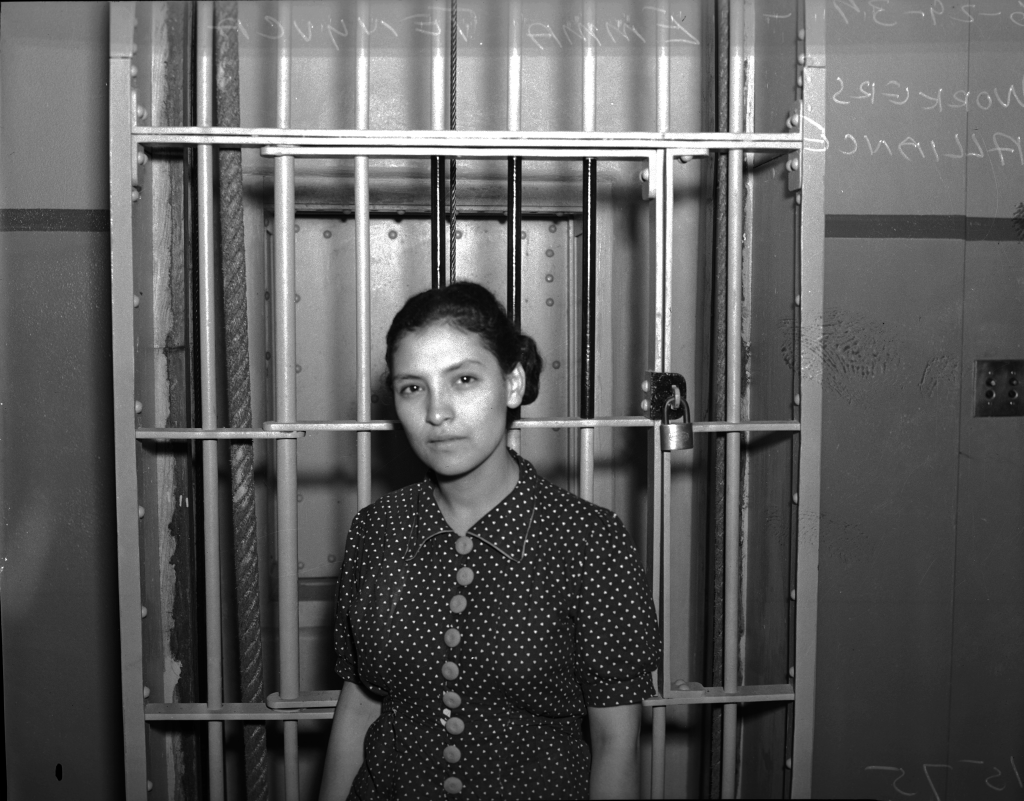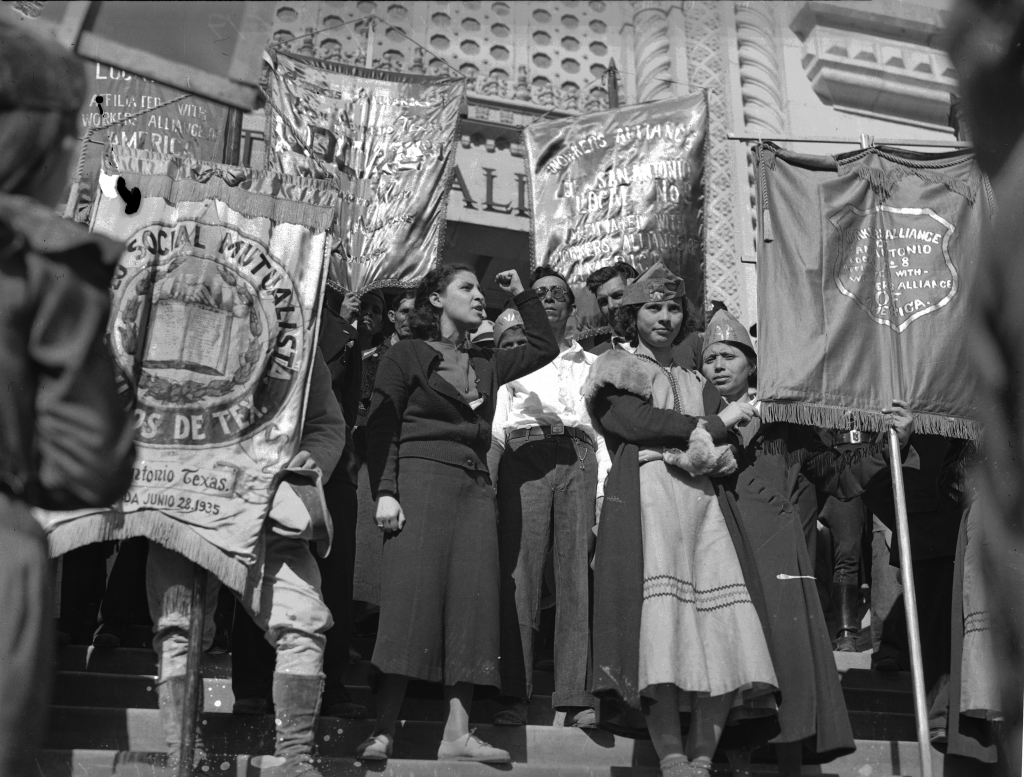This video was created by the New-York Historical Society Teen Leaders in collaboration with the Untold project.
Emma Tenayuca was born on December 21, 1916 in San Antonio, Texas. She was the oldest of her parents’ eleven children. Emma’s maternal grandparents encouraged her to take an interest in politics. They were both registered voters who debated local and state politics at home. Because of their influence, Emma paid attention to the world. She heard activists speaking in San Antonio’s public squares, read Spanish-language newspapers, and took notice when more and more workers lost their jobs in the wake of the economic depression.
Emma quickly noticed a pattern. The darker a person’s skin, the more he or she seemed to struggle. A common language did not unite San Antonio’s Spanish-speaking population. Rather, divisions existed based on economic status, skin tone, and heritage. Even her own family was divided. Emma’s mother’s family traced their heritage to Spanish colonizers who owned land in East Texas for generations. Emma’s father’s family was descended from the Native people of the region. Emma often noticed that her parents saw the world differently.
As a high school freshman, Emma joined the League of United Latin American Citizens. She was frustrated that the organization represented the same divides she witnessed at home. The group promoted assimilation with mainstream white American society, something with which Emma strongly disagreed. Emma realized that the league was eager to have her as a member because she was a light-skinned Latina with Spanish colonial ancestry. She believed there had to be another way.
When Emma was a high school junior, the all-women staff of the Finck Cigar Company went on strike to protest low wages. Emma was moved by their demand for justice and joined the picket line. When police broke up the picket, she was arrested. One year later, she graduated high school. Emma was not necessarily interested in becoming an activist or leader, but she knew that she had to fight the social injustices of the world.
In 1935, she joined the Young Communist League. The next year she joined the Communist Party. In the mid-1930s, the Communist Party took a new political position as popular opinion began to turn vehemently against the party. It attempted to build alliances with liberals and New Deal supporters. It welcomed people of all races and supported Franklin Roosevelt’s presidency. The party’s leaders argued that the New Deal provided necessary regulations and protections for hard-working Americans.
Emma’s involvement in Communist Party activities led her to join the Workers Alliance of America, a group dedicated to supporting laborers, particularly those unemployed during the Depression. By 1937, she was on their executive committee. In this role, she organized strikes, letter-writing campaigns, and other protests. Emma was often arrested for her activities and received regular threats from anti-labor activists.
Emma and her colleagues believed San Antonio was full of laborers in need of organizing. One of the largest groups in need of help was the pecan shellers union. In the 1930s, 40 percent of the nation’s pecans were shelled in Texas. Half of the pecan facilities were around San Antonio. Conditions in pecan shelling factories were horrifying. Rooms were severely overcrowded, with only one bathroom and poor ventilation. Pecan shellers, who were mostly women, suffered higher rates of tuberculosis and blamed their poor health on the work conditions.
On January 31, 1938, 12,000 pecan shellers went on strike to protest low wages and deplorable working conditions. Emma took on a leadership role in the strike through her work with the Workers Alliance of America. She spoke on behalf of the strikers and rallied workers on picket lines.
The strikers faced strong opposition. Over 1,000 strikers were arrested during the three-month strike. Local newspapers favored the interests of big business and portrayed Emma as a dangerous radical. Instead of focusing on the strikers’ demands for living wages and social justice, most articles talked about Emma and her Communist ties. Other leaders of the strike asked Emma to step out of the spotlight. She brought on too much negative attention.
Emma stayed involved, but from behind the scenes. Her work contributed to a positive outcome. Pecan shellers earned a wage increase. But the industry invested in more machines a few years later and many workers lost their jobs.
In 1938, Emma married Homer Brooks, a well-known leader of the Community Party who once ran for governor of Texas. Emma and Homer were a Communist power couple. They appeared in public together and co-wrote essays. They both believed in unity among the races, and their marriage (Homer was white) represented this. They also favored organized labor and supported FDR’s policies supporting workers. Through their combined efforts, both Emma and Homer rose in the party. Emma eventually took on the role of chairperson of the Texas State Committee of the Communist Party.
Emma took on a leadership role in the strike through her work with the Workers Alliance of America.
On August 25, 1939, Homer, Emma, and a colleague hosted a party meeting in the Municipal Building of San Antonio. Emma was against meeting in such a public place. Communist Russia recently aligned with Nazi Germany, increasing anti-Communist attitudes in the United States. But Homer did not want to back down. They had a permit from the mayor, who stated the Communist Party had the right to assemble in a public building.
Word of the mayor’s beliefs spread. 5,000 anti-Communist protestors assembled outside the building. Inside, Emma and Homer opened the meeting by singing the national anthem. When the crowd outside heard 150 Communists singing “The Star Spangled Banner,” they were furious. They threw rocks at the police stationed outside and forced their way inside. But the meeting room was empty. The attendees, including Homer and Emma, escaped through a secret passage under the building. Anti-Communists destroyed the room and held an “Americanism” rally, during which they denounced all Communists and the mayor, whom they burned in effigy. In the days that followed, Emma received many death threats.
Emma fled San Antonio for Houston, where she worked in a series of office jobs to make money. She occasionally participated in Communist Party activities on a smaller scale. She and Homer divorced in 1941.
The early 1940s were a stressful time for Emma, but she did not know that there was a looming threat following her. Although Emma was less involved in politics, the FBI watched her. They kept a massive file on Emma and her associates. Undercover agents attended meetings where she was present, eavesdropped on her conversations, and interviewed former colleagues and friends. Emma appeared on lists of enemies to the federal government.
In 1942, Emma applied to serve in the Women’s Auxiliary Army Corps. Her application was denied. Although she never received a reason, her FBI file likely blacklisted her from government service.
Emma moved to California in 1945 and ended her membership in the Communist Party shortly after that. Although she still believed in social justice and racial unity, the war and other factors pushed her away from organized politics.
Emma went back to school and completed her undergraduate degree at San Francisco State University. She began a teaching career, which she continued after returning to San Antonio in 1968. She retired in 1982.
Although Emma was no longer a public figure, she found ways to remain politically involved. She mentored students who expressed an interest in activism and encouraged them to study American labor history.
Emma died on July 23, 1999 in San Antonio. The Tejano community honored her and described her “La Pasionaria de Texas”—the passionflower of Texas.
Vocabulary
- blacklisted: Placed on a list of people who cannot be trusted.
- communism: A political system in which all goods and items of value are collectively owned and distributed to citizens equally.
- Communist Party: A political party that seeks to achieve the social and economic goals of communism.
- effigy: A sculpture or model of a person, often made to be destroyed as a form of protest.
- municipal: Related to a city.
- Tejano: Someone of Hispanic heritage from Texas.
Discussion Questions
- How were Emma’s political views shaped by her childhood and family heritage?
- Why was Emma drawn to the Communist Party? What were some of her key ideals?
- Why was Emma asked to step down from leading the pecan shellers’ strike? What does this say about the intersection of organized labor, politics, and popular opinion? What does it say about gender and the status of women in political movements?
- Why did Emma exile herself from high-profile political action? How did she continue to be involved?
- Why was the FBI so interested in Emma? How did that attention shape her life?
Suggested Activities
- APUSH Connection: 7.9: The Great Depression
- Emma is part of a long history of female labor leaders. Compare her life story with those of Clara Lemlich and Ella May Wiggins. How was her life different, particularly given that she was not an industrial worker, but an outside organizer?
- The Communist Party was a growing presence in 1920s–1930s America. Connect Emma’s story to that of other women activists associated with the Communist Party, including Ella May Wiggins and militant housewives.
- Emma witnessed firsthand the complications of Mexican American life in Texas. Study the challenges of the Latinx community by pairing her life story with that of Jovita Idar and the newspaper articles about El Paso laundry workers.
Themes
ACTIVISM AND SOCIAL CHANGE; WORK, LABOR, AND ECONOMY; AMERICAN IDENTITY AND CITIZENSHIP








